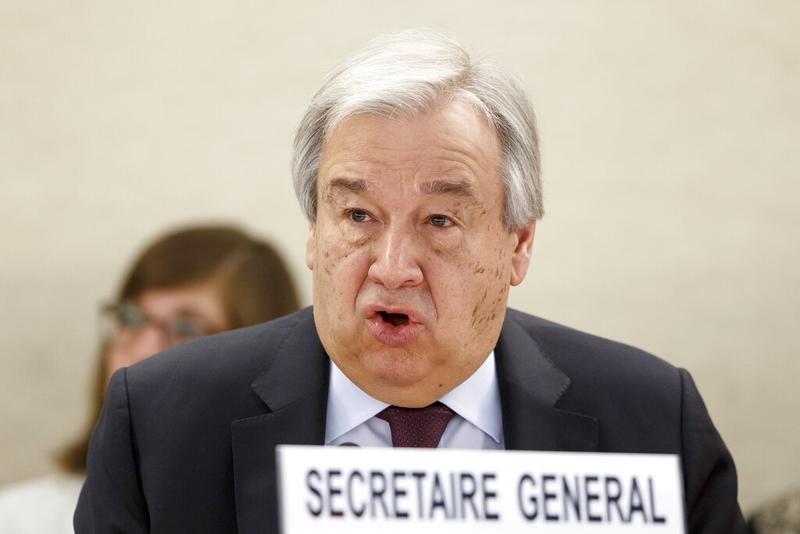 UN Secretary-General Antonio Guterres addresses his statement during the opening of the High-Level Segment of the 43rd session of the Human Rights Council, at the European headquarters of the United Nations in Geneva, Switzerland, Feb 24, 2020. (SALVATORE NOLFI / KEYSTONE VIA AP)
UN Secretary-General Antonio Guterres addresses his statement during the opening of the High-Level Segment of the 43rd session of the Human Rights Council, at the European headquarters of the United Nations in Geneva, Switzerland, Feb 24, 2020. (SALVATORE NOLFI / KEYSTONE VIA AP)
United Nations Secretary-General Antonio Guterres called women’s inequality “stupid” and a cause for global shame on Thursday, as he pledged to press governments to end discriminatory laws in the face of a “strong and relentless pushback” against women’s rights.
While Guterres did not name and shame, US President Donald Trump’s administration has led a push at the UN against the promotion of sexual and reproductive health services for women because the administration sees that as code for abortion.
Just as slavery and colonialism were a stain on previous centuries, women’s inequality should shame us all in the 21st. Because it is not only unacceptable; it is stupid.
Antonio Guterres, UN secretary-general
Speaking ahead of the annual meeting of the UN Commission on the Status of Women in New York next month, Guterres warned that the state of women’s rights was dire and said he would seek to end “default male thinking” across the United Nations.
ALSO READ: UN chief is blunt: Women remain excluded from peace tables
“Just as slavery and colonialism were a stain on previous centuries, women’s inequality should shame us all in the 21st. Because it is not only unacceptable; it is stupid,” Guterres said in a speech to The New School in New York.
He said legal protections against rape and domestic violence were being diluted or rolled back and that in 34 countries rape within marriage was still legal.
“There is a strong and relentless pushback against women’s rights,” Guterres said. “Women’s sexual and reproductive rights are under threat from different sides.”
READ MORE: UN chief warns of 'relentless' pushback on women's rights
Language promoting women’s sexual and reproductive health is long-agreed internationally, including in resolutions adopted by the Security Council in 2009 and 2013 and several resolutions adopted annually by the 193-member General Assembly.
However, the United States under Trump has pushed to remove such language from new UN resolutions. The Trump administration also cut funding in 2017 for the UN Population Fund because it believed it was linked to an abortion program, but the UN said that was an inaccurate perception.
Women have equaled and outperformed men in almost every sphere. It is time to stop trying to change women, and start changing the systems that prevent them from achieving their potential.
Antonio Guterres
The US Supreme Court ruled in 1973 that women have the right to choose whether or not to have an abortion but the issue is still divisive in the United States.
“The UN should not put itself in a position of promoting or suggesting a right to abortion, whether it is humanitarian or development work,” US Ambassador to the United Nations, Kelly Craft, said in October.
The United States has received support for its stance from countries including Russia, Egypt, Saudi Arabia, United Arab Emirates, Brazil, Guatemala, Nigeria, Democratic Republic of Congo, Mali, Sudan, Uganda, Poland and Hungary.
Last year Washington threatened to veto a Security Council resolution if a reference was not cut citing the need for UN bodies and donors to give timely “sexual and reproductive health” assistance to survivors of sexual violence in conflict.
Guterres said on Thursday he would urge governments to achieve gender parity in senior leadership. He said he achieved gender parity among his senior leadership team - on Jan 1, 90 women and 90 men were in the ranks of full-time senior leadership, two years ahead of the target date he set.
“Women have equaled and outperformed men in almost every sphere,” he said. “It is time to stop trying to change women, and start changing the systems that prevent them from achieving their potential.”
READ MORE: Higher-paid jobs in Singapore still dominated by men



